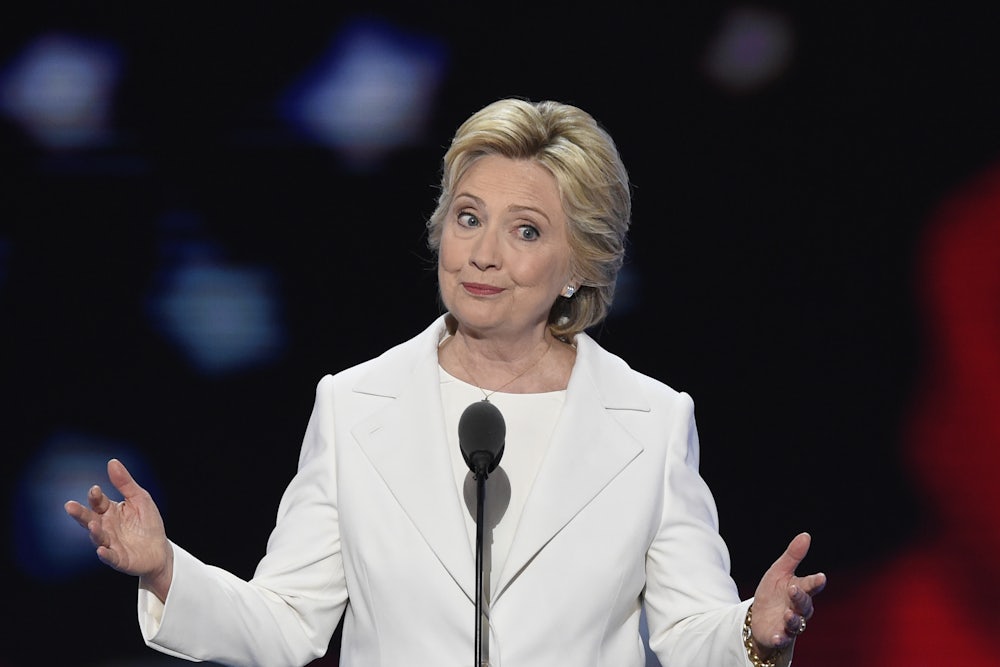The Democratic National Convention ended much as it began. Facing a divided audience on the final night, Hillary Clinton preached unity. Instead, some supporters of her vanquished rival Bernie Sanders booed her, so much so that Clinton supporters tried to drown them out—successfully, for the most part—with chants of “Hill-a-ry.”
The competing slogans were just one example of the disunity on display all week in Philadelphia. The anti-DNC protests began even before the convention did. On Tuesday, hundreds of Sanders delegates staged a walkout in the Wells Fargo Center. Some Bernie supporters even wanted to make a “citizen’s arrest” of Clinton on Wednesday for allegedly orchestrating the election fraud that they believe denied Sanders victory.
But the deep divisions that Clinton hopes to heal go far beyond Bernie-or-Bust dead-enders. Donald Trump has opened up deep fissures in the country on race, gender, and class by presenting himself as the avatar of the “forgotten” Americans, who to judge by his rhetoric and support consists of protestant white men who feel the country is being taken over by alien forces.
In response to Trump, Clinton has presented herself as an all-inclusive candidate—to a fault. She’s become a politician who offers something to everyone. In doing so, she risks validating the negative, oft-peddled view of her as a cynical politician who will do anything to win and who has no core principles. And that could hurt her come November.
The quest for national unity could be heard not just in Clinton’s big convention speech (“stronger together”), but from speakers all week. The DNC included the left-most wing of the Democratic Party (Bernie Sanders and Elizabeth Warren) but also erstwhile Republicans like Michael Bloomberg and former Reagan advisor Doug Elmets. Clinton’s expansive embrace of anyone who rejects Trump created a contentious convention where left-wing delegates shouted “no more war!” at several speakers, including retired Marine Corps General John Allen and former Secretary of Defense Leon Panetta.
Strange as it may sound, Clinton has assembled a coalition that is too big, which makes it unwieldy and riven with internal contradictions. Beyond the challenge of keeping such a coalition together, the ungainly nature of the anti-Trump popular front means that Clinton and the Democrats didn’t offer a coherent message in Philadelphia. The convention had moments of greatness, as when the immigrant Muslim father of a fallen Army soldier noted that Trump has never sacrificed anything for his country. But taken as a whole, the convention was a dog’s breakfast of political messages.
The same was true of Clinton’s speech. “I will be a president for Democrats, Republicans, and Independents,” she said. “For the struggling, the striving and the successful. For those who vote for me and those who don’t. For all Americans.”
A president has to serve the entire nation, of course. But in political terms, any positive achievement will be supported by some and opposed by others. Which means the slogan “stronger together” has limited value if you want to actually set an agenda, in contrast to more polarizing slogans that move the political conversation forward, like “Black Lives Matter.”
“We are the party of workers,” Clinton said. If that’s true, how can the Democrats also be the party of Michael Bloomberg and the well-heeled suburban Republicans whose votes are being so strenuously chased?
There is evidence that Clinton’s outreach to Republicans is working, that it’s slowly peeling away support from the GOP. Rich Galen, who had served as press secretary for Vice President Dan Quayle and House Speaker Newt Gingrich, tweeted: “How can it be that I am standing at my kitchen counter sobbing because of the messages being driven at the DNC? Where has the GOP gone?”
But in politics, every gain has some cost. If you start winning over right-wingers like Galen, or at least earn their grudging acceptance, you will be alienating the left-wing Democrats who chanted “no more war.”
Clinton is making a bet on unity. The bet might pay off by expanding the Democratic Party, but it also runs the risk of losing many traditional Democratic voters. Trump is so extreme that Clinton could bring together a winning coalition of moderate Republicans and left-wing Democrats. But the result, as Lyndon Johnson found out after he crafted a similar coalition in 1964 to defeat Barry Goldwater, is that too many competing factions are invested in you.
In Clinton’s case, a large contingent of left-wingers might not want to be members of a party that is trying to win over former Reaganites; the behavior from many Sanders’s supporters this week suggests as much. Her broad coalition may win her the White House this fall, but vulnerabilities loom on the horizon—and the consequences could be long-lasting for Democrats. If the Republicans get their act together and nominate a reasonable candidate in 2020, Clinton’s coalition could collapse on both ends, with the left no longer buying lesser-evil arguments and #NeverTrump Republicans returning home. Clinton’s short-term gain could be her party’s long-term pain.
